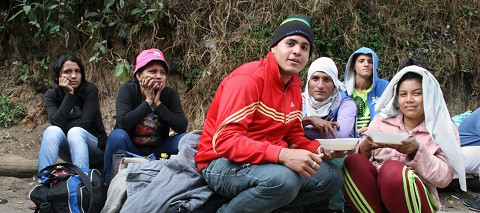
GCED Basic Search Form
Quick Search
أنت هنا
الأخبار

The situation of Venezuelan refugee and migrant families that were in a fragile situation before the pandemic is now aggravated by their loss of employment, difficulties in accessing emergency services and benefits, and lack a of access to healthcare systems.
As they do not longer have the livelihoods to stay in their host countries or have been unable to access emergency responses due to the States' pressure and redefinition of priorities, many Venezuelans have decided to return to Venezuela. Throughout different cities in the region, many Venezuelan families are awaiting humanitarian assistance that will provide them with options to return, exposing themselves to risks of infection due to irregular movements between countries and across borders.
In educational matters, 100% of the Venezuelan children and adolescents who were enrolled in their host countries are currently out of school and without a certain return. The interruption of learning has also spread among children and adolescents who had already had their studies interrupted when they started their displacement. There are also those who, despite being enrolled in educational centers in their host countries, due to confinement have not been able to begin their school year, losing contact with their educational communities.
Despite the efforts of the Ministries of Education to diversify remote education mechanisms towards the inclusion of television channels and radio programs (and beyond the existing web platform,) their current habitability conditions, lack of access to technologies, internet and educational material are barriers that displaced children and adolescents have been experiencing in their attempts to access the educational responses implemented in the host communities.
All these factors can put at risk the return of Venezuelan children and adolescents to school. The experience of other crises shows us that the longer learning is interrupted and schools remain closed, the more likely it is that children and adolescents on the move will not return to school.
This situation presents unprecedented challenges for the educational systems of our region. In this context, UNESCO proposes five key messages to focus the efforts of the education sector on the objective of guaranteeing the right to education and providing migrant and refugee children and youth with the knowledge and skills necessary to save and sustain their lives through education.
- Advocacy: Prioritize vulnerable and marginalized groups, especially refugee and migrant children and adolescents, to guarantee the right to quality public education amid reduced funding and fiscal spaces.
- Policy change: Diversify learning pathways and programs that respond to the needs of students and their contexts.
- Dialogue and exchange of knowledge and resources: Participate in spaces for political and technical dialogue and share knowledge and resources.
- Multisectoral response: Reach beyond the thoughts and actions of the education sector, linking it to health, nutrition, social protection and livelihoods.
- Capacity development: Ensure adequate national competencies to respond now and build resilient educational systems.
URL:
